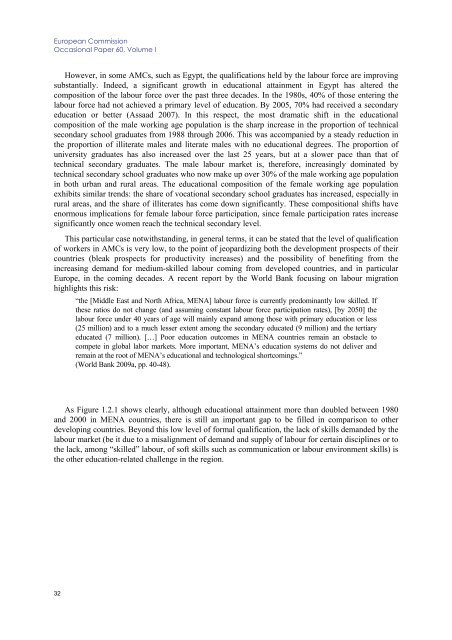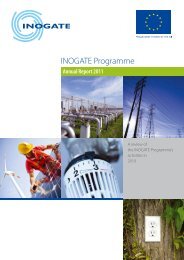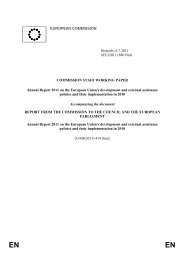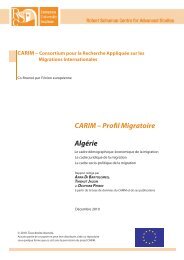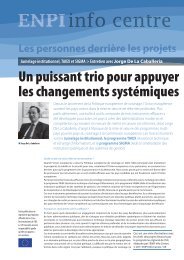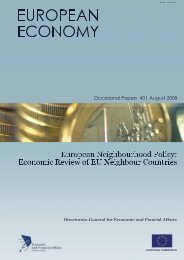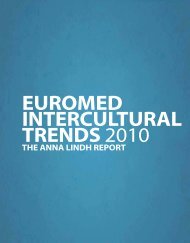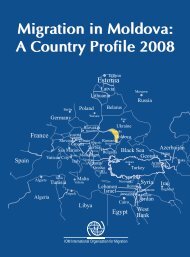Labour market performance and migration flows - European ...
Labour market performance and migration flows - European ...
Labour market performance and migration flows - European ...
Create successful ePaper yourself
Turn your PDF publications into a flip-book with our unique Google optimized e-Paper software.
<strong>European</strong> CommissionOccasional Paper 60, Volume IHowever, in some AMCs, such as Egypt, the qualifications held by the labour force are improvingsubstantially. Indeed, a significant growth in educational attainment in Egypt has altered thecomposition of the labour force over the past three decades. In the 1980s, 40% of those entering thelabour force had not achieved a primary level of education. By 2005, 70% had received a secondaryeducation or better (Assaad 2007). In this respect, the most dramatic shift in the educationalcomposition of the male working age population is the sharp increase in the proportion of technicalsecondary school graduates from 1988 through 2006. This was accompanied by a steady reduction inthe proportion of illiterate males <strong>and</strong> literate males with no educational degrees. The proportion ofuniversity graduates has also increased over the last 25 years, but at a slower pace than that oftechnical secondary graduates. The male labour <strong>market</strong> is, therefore, increasingly dominated bytechnical secondary school graduates who now make up over 30% of the male working age populationin both urban <strong>and</strong> rural areas. The educational composition of the female working age populationexhibits similar trends: the share of vocational secondary school graduates has increased, especially inrural areas, <strong>and</strong> the share of illiterates has come down significantly. These compositional shifts haveenormous implications for female labour force participation, since female participation rates increasesignificantly once women reach the technical secondary level.This particular case notwithst<strong>and</strong>ing, in general terms, it can be stated that the level of qualificationof workers in AMCs is very low, to the point of jeopardizing both the development prospects of theircountries (bleak prospects for productivity increases) <strong>and</strong> the possibility of benefiting from theincreasing dem<strong>and</strong> for medium-skilled labour coming from developed countries, <strong>and</strong> in particularEurope, in the coming decades. A recent report by the World Bank focusing on labour <strong>migration</strong>highlights this risk:“the [Middle East <strong>and</strong> North Africa, MENA] labour force is currently predominantly low skilled. Ifthese ratios do not change (<strong>and</strong> assuming constant labour force participation rates), [by 2050] thelabour force under 40 years of age will mainly exp<strong>and</strong> among those with primary education or less(25 million) <strong>and</strong> to a much lesser extent among the secondary educated (9 million) <strong>and</strong> the tertiaryeducated (7 million). […] Poor education outcomes in MENA countries remain an obstacle tocompete in global labor <strong>market</strong>s. More important, MENA’s education systems do not deliver <strong>and</strong>remain at the root of MENA’s educational <strong>and</strong> technological shortcomings.”(World Bank 2009a, pp. 40-48).As Figure 1.2.1 shows clearly, although educational attainment more than doubled between 1980<strong>and</strong> 2000 in MENA countries, there is still an important gap to be filled in comparison to otherdeveloping countries. Beyond this low level of formal qualification, the lack of skills dem<strong>and</strong>ed by thelabour <strong>market</strong> (be it due to a misalignment of dem<strong>and</strong> <strong>and</strong> supply of labour for certain disciplines or tothe lack, among “skilled” labour, of soft skills such as communication or labour environment skills) isthe other education-related challenge in the region.32


